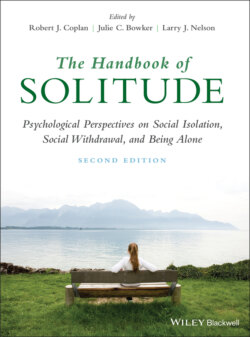Читать книгу The Handbook of Solitude - Группа авторов - Страница 65
Idiom
ОглавлениеFollowing Winnicott, Christopher Bollas (1989) posited that each human being has a true self, which may be called idiom, “an inherited set of dispositions” (p. 10), a “unique nucleus” (p. 212), which is present before object relating. The idiom meets culture and, through their dialectic, the psychic life of the individual develops. It is a form of knowledge that Bollas (1989) named the unthought known, in the sense of knowledge that exists from the beginning of life but has not been thought out.
It depends on the familial environment how much of this thought will be employed in a child’s life. When the environment facilitates the expression of the idiom, it has a transformational effect on the infant who experiences a kind of pleasure, which Bollas (1989, p. 19) describes with the Lacanian term jouissance, “the subject’s inalienable right to ecstasy.” In other words, parents set the foundation for what Bollas (1992) called being as character, and is conceptualized as the child’s ability to let his/her idiom be expressed by getting absorbed in playing (the process of play), even if this expression is not without risks (i.e., “what will happen to me if I surrender myself in playing?”).
The idiom reflects the fundamental and primary aloneness of the individual; “solitude is the container of self” (Bollas, 1989, p. 20). Bollas (1989) defined this inevitable and authentic aloneness as follows:
In our true self we are essentially alone. Though we negotiate our ego with the other and though we people our internal world with selves and others, and though we are spoken to and for by the Other that is speech (Lacan’s theory of the Symbolic) the absolute core of one’s being is a wordless, imageless solitude. We cannot reach this true self through insight or introspection. Only by living from this authorizing idiom do we know something of that person sample that we are. (p. 21)
By creatively combining the ideas of Winnicott and Lacan, Bollas describes aloneness as a (genetic) predisposition and fundamental condition, out of which the individual’s character emerges. Aloneness is regarded, therefore, as a unique nucleus of self, called idiom, which will always remain in a solitary state, that is, unthought, unknown, unspoken, and non‐shareable. This means that the human being, although “individual,” will always remain internally “divided” between the unconscious and the conscious aspects of self. However, from the beginning of life this solitary nucleus is destined to encounter the outer world and be in a dialectical tension with it. It is only when family acknowledges and respects the child’s uniqueness, allowing it to be “lived” in everyday interactions, that the child becomes able to develop his/her psychic life, based on mutual enrichment between the idiom and the environment.
